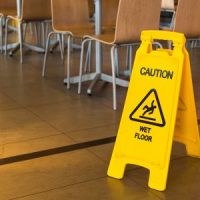The Ins and Outs of Restaurant Slip-and-Fall Injuries

These incidents are the leading cause of injury at public buildings, restaurants, and hotels. 70 percent of these incidents occur on flat, level surfaces. This high figure suggests that a hazard or obstacle, like a wet spot or loose rug, causes most restaurant falls. In Texas, restaurant owners have a very high duty of care to keep customers, and employees, reasonably safe. More on that below.
Usually, injured restaurant workers can file workers’ compensation claims and obtain financial benefits, like lost wage replacement and medical bill payment. If the victim was a non-employee, a Sugar Land slip and fall lawyer can file a civil action and obtain additional compensation. In addition to economic losses, such as medical bills, these damages include noneconomic losses, such as pain and suffering.
Legal Issues
This compensation is available if a Missouri City personal injury lawyer proves negligence, or a lack of care, by a preponderance of the evidence, or more likely than not.
An attorney cannot establish a lack of care without establishing the standard of care. In Texas, the standard of care varies in different situations, as follows:
- Invitee: All restaurant customers are invitees. They usually buy food, which benefits the owner financially. Even if they only drink a free glass of water, they’re usually invitees. The foot traffic benefits the owner. If the victim is an invitee, the owner has a duty of reasonable care. That’s one of the law’s highest safety responsibilities.
- Licensee: Since every guest benefits a restaurant owner, very few customers are licensees (permission to be on the land but no benefit to the owner). Children who cut across the parking lot on their way to and from school are usually licensees. A lower standard of care applies in these situations.
- Trespasser: Most restaurants have “no shoes, no shirt, no service” conduct rules. Legally, the moment a victim violates such a rule, the victim becomes a trespasser. Owners usually have no legal duty to protect trespassers. Some legal loopholes, like the attractive nuisance rule, protect some trespassers in some situations.
These categories sometimes overlap. If Rick goes to a restaurant, lights a cigarette, and then extinguishes it, he moves from an invitee to a trespasser to an invitee.
Location Issues
Defendants are only liable for damages if they had control over the property where the fall occurred. Suing the wrong defendant could have serious consequences.
Most restaurants have exclusive control over their spaces and the common areas immediately in front of their spaces. Usually, a landlord controls general common areas, such as the large parking lot.
Property control is connected to knowledge of the hazard, an essential element of a premises liability claim. A victim/plaintiff must prove the owner knew about, or should have known about, the injury-causing hazard.
Direct evidence of actual knowledge is the best evidence in these cases. Jurors are very unsympathetic towards defendants who ignore known risks. Circumstantial evidence of constructive knowledge (should have known) is admissible as well. The longer a wet spot or other hazard existed, the more likely it is that the owner should have addressed it.
Work With a Diligent Harris County Attorney
Injury victims are entitled to significant compensation. For a free consultation with an experienced personal injury attorney in Missouri City, contact the Henrietta Ezeoke Law Firm. We routinely handle matters throughout Greater Houston.
Source:
lighthouseenterprises.us/Hurricone/Slip%20n%20Fall.pdf
